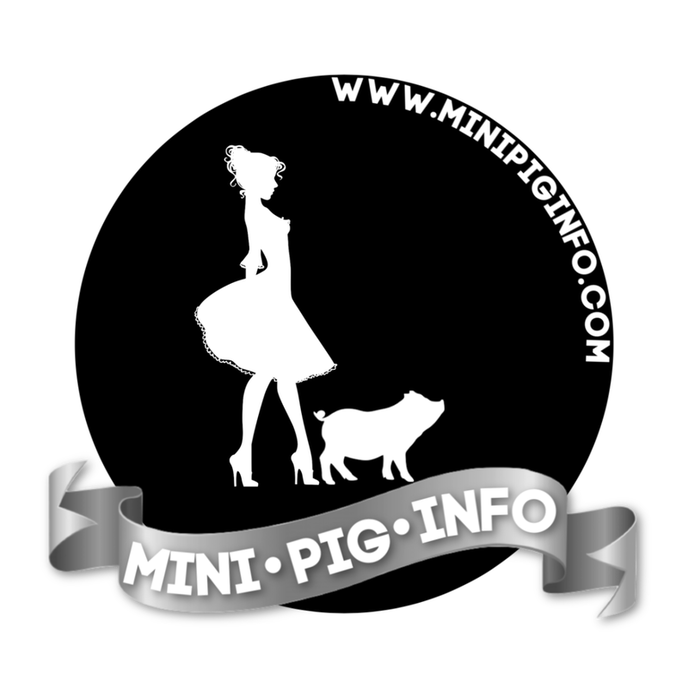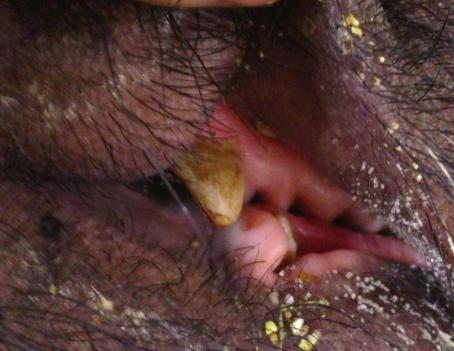|
There aren't many things like the smell of that obnoxious bad breath that some pigs get. Halitosis is a relatively common complaint in pig world, but more importantly, why do they get it and how do you get rid of it?
Most of the time, bad breath is a result of periodontal disease- which is found in about 85% of all pets! As bacteria build up on the teeth and form plaque, the resulting smell can get very noticeable indeed. As untreated periodontal disease progresses, the smell only worsens. Combine the inability to brush the teeth with a pelleted diet that is recommended to be soaked first and you have nothing substantial to even help remove the plaque from the teeth. (As in, nothing hard that can help scrape the build-up off the teeth). . Gingivitis (inflammation of the gums) is one of the first changes to occur. However, the majority of dental disease occurs below the gumline, where a pet owner is unable to actually see the damage being done to their pet’s teeth. In these cases, treating the periodontal disease helps the symptoms resolve. The most beneficial treatment is a full cleaning at the veterinarian, though home care such as toothbrushing and dental chews can help preserve dental health in between cleanings. You should start this excellent dental hygiene when your pig is a piglet (preferably) and continue for the rest of your pigs life. Once a routine has been adopted, your pig will be much less likely to resist that type of care. Whimzee's are a popular "dental chew" type of treat many pig parents use. However, because pigs tend to swallow and not always chew food, it is imperative that you find the correct size treat for your pig, if swallowed whole, it can cause a host of other problems like choking or potential obstructions. Keep in mind, teeth can decay and become infected, when this happens and left untreated, these infections can become systemic and spread throughout the body. This is the perfect spot for bacteria, which love moist, dark, nutrient rich places to thrive. Look in your pigs mouth, feel around for anything unusual, smell your pigs breath to be sure you do not to intervene in any way. Dr. Curt Coffman’s wrote a research report on the emerging data confirming the serious negative health implications for pets' internal organ systems as a result of the movement of oral cavity bacteria from the mouth into the bloodstream, much the same as humans. Evidently, periodontal disease can shorten your pigs life by affecting vital organ systems, again, just like humans. For instance, bacteria can migrate to the heart affecting the endocardium, which is the lining within the chambers of the heart, resulting in growth of bacteria to the valves which affect the blood flow, atrial kick, back flow and the overall pumping of the heart. These heart murmurs (which is what this causes) over time can cause significant damage to the heart. The compromised heart is required to work harder to meet the body’s demands for blood flow and oxygen, so heart failure ultimately ensues. Aside from the periodontal disease, halitosis can also result from other medical conditions. Conditions of the mouth and throat such as bacterial infections, fungal overgrowth, or cancer can create bad breath. Systemic diseases such as diabetes or kidney disease are also known for affecting the breath. An experienced veterinarian can often differentiate the uremic breath of kidney disease from the ketone breath of diabetes, but for most of us that diagnosis requires bloodwork. For example, a sweet fruity smelling breath may indicate ketoacidosis which can be deadly if not treated promptly in humans. (I assume pigs aren't any different) There have been cases of abscesses along the lining of the throat that weren't discovered early on that could have possibly been identified earlier had bad breath been an issue. So pay attention to everything. Since pigs can not talk, we rely on their body language and our ability to identify a potential problem in order to catch these kind of things early on. Lastly, bad breath can be diet related, especially if the pet is on a strong-smelling fish based diet or has a habit of eating poop (a condition we call coprophagia.) In mini pigs specifically, they have "pockets" in the mouth that can collect different substances from dirt to grass and anything else that has been ingested, so be sure to check the mouth as well. You can do this by getting your piggy down for a belly rub just before bedtime. Put a little sugar or jelly on one finger, and feel around inside piggy's mouth. Pigs jaws do not open very wide (a cat or dog can open theirs' really wide), so don't push too hard. Feel for anything that doesn't belong inside the mouth. There's often a pocket behind the last molar that collects bits of food and other stuff. Be sure to check the gemlike above the teeth as well, this is also an area that commonly collects bits and pieces of food. Or, if your piggy is young and has recently lost a baby tooth, the gap may be filled with food or dirt. Do this every night for several nights in a row, then keep at it at least once a week. If the breath is bad enough to bother you, it’s probably something that will need a vet exam to solve. If you decide to try brushing your pigs teeth, use a pet toothpaste and a traditional toothbrush or one of the finger brushes (assuming your pig is not a biter). The good news is, most cases of halitosis are highly treatable. To read more regarding dental health, click here to view our page that discusses tooth and tusk care. Talk to your vet about your pigs dental hygiene, determine if your pig needs a routine cleaning done by a veterinarian dental specialist, and be sure to discuss any symptoms your pig may be having. (such as bad breath or broken teeth, etc)
3 Comments
|
AuthorsBrittany Sawyer Archives
July 2019
Categories
All
|
-
- Direct Links To Website Content
- Read BEFORE You Add A Pig To Your Family
- Mini Pig Info Mission
- Teacup/Micro Pig Myth
- What Is A Mini Pig?
- Mini Pig Breeds: Which Ones Are Really Breeds?
- Adoptable Mini Pigs
- Are You As Smart As Your Pig?
- Mini Pig Info Education Series
- Social Media Feeds
- Zoonotic Diseases & Mini Pigs
- Mini Pigs Are NOT Gifts!
- Media/News Links
-
- Pig Health Forms: Tools To Use To Determine If Your Pig Is Sick
-
- Mini Pigs & Erysipelas: Life Saving Info About This Disease
- Dippity Pig Syndrome In Mini Pigs
- Mini Pig Salt Toxicity/Water Deprivation
- Leptospirosis In Mini Pigs
- Swine Pox & Mini Pigs
- Gastric Ulcers: Common Problem For Mini Pigs
- Brucellosis And Mini Pigs
- Mini Pig Pneumonia & Swine Flu
- Foot and Mouth Disease (FMD): A Problem For Pigs In Other Countires
- Pseudorabies: Is My Mini Pig At Risk?
- Mycoplasma Hyosynoviae & Mini Pigs
- Head Tilt In Mini Pigs
- Mini Pig Obstructions: How To Reduce The Risk For Your Pig
- Seizures In Mini Pigs
- Mini Pig Salmonellosis
- PSS (Porcine Stress Syndrome)
- Urinary Tract Infections (UTI) In Mini Pigs
- Urinary Blockages: A Serious Problem For Mini Pigs
- Arthritis And Mini Pigs
- Mini Pig Artophic Rhinitis
- Mini Pig Heart Disease Possibilities
- Common Mini Pig Gastrointestinal Disorders
- Mini Pigs & Pasteurellosis
- Mini Pigs And Rabies
- Mini Pig Genetic Abnormalities
- MIni Pigs & Cancer
- Mini Pig Cough
- Causes For Sudden Death In Mini Pigs
-
- Mini Pig Approved Foods
- Natural Diet For Mini Pigs: How To Create A All-Natural Diet For Your Pig
- Balancing Your Mini Pigs Diet With Activity
- Mini Pig Feed Concerns: Bad/Spoiled Feed
- Mini Pig Nutritional Deficiencies
- How To Estimate A Pigs Weight Without A Scale
- Mini Pig Body Scoring: What Does An Unhealthy Mini Pig Look Like?
- How To Help Your Mini Pig Lose Weight
- Mini Pig Treats And Recipes
- Mini Pig Hydration: The Importance Of Water
-
- Mini Pig CPR/Heimlich Manuever
- Mini Pig Constipation
- How To Treat A Vomiting Mini Pig
- What To Do If Your Mini Pig Gorges On Food?
- Salt Toxicity/Water Deprivation In Mini Pigs
- How To Treat A Fever In Mini Pigs
- Basic Wound Care For Mini Pigs
- Acute Mini Pig Paralysis
- Mini Pig Shock
- What To Do If Your Mini Pig Sustains A Fracture?
- Treatment For Mini Pig Diarrhea
- Hidden Dangers For Mini Pigs: Snakes & Spiders
- Mini Pig Emergency Supplies
- Most Common Mini Pig Problems
-
- Underaged Piglets- The Dangers & Amount Of Care Involved
- How To Estimate The Age Of A Mini Pig
- Mini Pigs and Dogs- Predator Versus Prey- A Risky Combination
- Mini Pig Name Suggestions
- Bathing Mini Pigs
- Mini Pig Travel Regulations
- Mini Pig FAQ
- "Forking" Mini Pigs- No, We Aren't Talking About Eating!
- Mini Pig Potty Training Tips
- Pigs And Stairs: A Potentially Flawed Living Arrangement
- Capturing A Mini Pig On The Loose
- Indoor Mini Pig Spaces
-
-
- Mini Pig Sounds 101
- Mini Pig Harness Training
- Important Information & Tips For Training Your Mini Pig
- Teaching Your Pig To Do Tricks
- Decoding Mini Pig Behavioral Problems
- Mini Pig Behavior: A Quick Introduction
- Common Behavioral Issues In Mini Pigs
- Move The Pig By Lydia Weaver
- Food Aggression In Mini Pigs
- Aggressive Mini Pigs
- Spoiled Pig Syndrome
- ESA (Emotional Support Animals)/Therapy Pets And Service Animals: What Applies To My Mini Pig?
- Mini Pigs Can Be Fun: Training Your Pig Is Key!
-
- Mini Pig Themed Greeting Cards
- Mini Pig DIY Items: Ideas & Inspiration
- Mini Pig Community Chat Forum
- The Loss Of Your Mini Pig
- Website Survey & Various MPI Video Collection
- Mini Pig Research/News Links
- PAL (Pig Advocates League): Our Nonprofit Sister Organization
- Kids Corner: Mini Pig Items For Kids
- Mini Pig Meme's:
- Mini Pig Sitters
- Mini Pig Outreach-Educational Information
- Community Groups For Mini Pig Parents
- "Pigtionary"
- Pig Anatomy and Terminology
- Mini Pig Info Store
- Dear Pig Whisperers Blog
-
- Direct Links To Website Content
- Read BEFORE You Add A Pig To Your Family
- Mini Pig Info Mission
- Teacup/Micro Pig Myth
- What Is A Mini Pig?
- Mini Pig Breeds: Which Ones Are Really Breeds?
- Adoptable Mini Pigs
- Are You As Smart As Your Pig?
- Mini Pig Info Education Series
- Social Media Feeds
- Zoonotic Diseases & Mini Pigs
- Mini Pigs Are NOT Gifts!
- Media/News Links
-
- Pig Health Forms: Tools To Use To Determine If Your Pig Is Sick
-
- Mini Pigs & Erysipelas: Life Saving Info About This Disease
- Dippity Pig Syndrome In Mini Pigs
- Mini Pig Salt Toxicity/Water Deprivation
- Leptospirosis In Mini Pigs
- Swine Pox & Mini Pigs
- Gastric Ulcers: Common Problem For Mini Pigs
- Brucellosis And Mini Pigs
- Mini Pig Pneumonia & Swine Flu
- Foot and Mouth Disease (FMD): A Problem For Pigs In Other Countires
- Pseudorabies: Is My Mini Pig At Risk?
- Mycoplasma Hyosynoviae & Mini Pigs
- Head Tilt In Mini Pigs
- Mini Pig Obstructions: How To Reduce The Risk For Your Pig
- Seizures In Mini Pigs
- Mini Pig Salmonellosis
- PSS (Porcine Stress Syndrome)
- Urinary Tract Infections (UTI) In Mini Pigs
- Urinary Blockages: A Serious Problem For Mini Pigs
- Arthritis And Mini Pigs
- Mini Pig Artophic Rhinitis
- Mini Pig Heart Disease Possibilities
- Common Mini Pig Gastrointestinal Disorders
- Mini Pigs & Pasteurellosis
- Mini Pigs And Rabies
- Mini Pig Genetic Abnormalities
- MIni Pigs & Cancer
- Mini Pig Cough
- Causes For Sudden Death In Mini Pigs
-
- Mini Pig Approved Foods
- Natural Diet For Mini Pigs: How To Create A All-Natural Diet For Your Pig
- Balancing Your Mini Pigs Diet With Activity
- Mini Pig Feed Concerns: Bad/Spoiled Feed
- Mini Pig Nutritional Deficiencies
- How To Estimate A Pigs Weight Without A Scale
- Mini Pig Body Scoring: What Does An Unhealthy Mini Pig Look Like?
- How To Help Your Mini Pig Lose Weight
- Mini Pig Treats And Recipes
- Mini Pig Hydration: The Importance Of Water
-
- Mini Pig CPR/Heimlich Manuever
- Mini Pig Constipation
- How To Treat A Vomiting Mini Pig
- What To Do If Your Mini Pig Gorges On Food?
- Salt Toxicity/Water Deprivation In Mini Pigs
- How To Treat A Fever In Mini Pigs
- Basic Wound Care For Mini Pigs
- Acute Mini Pig Paralysis
- Mini Pig Shock
- What To Do If Your Mini Pig Sustains A Fracture?
- Treatment For Mini Pig Diarrhea
- Hidden Dangers For Mini Pigs: Snakes & Spiders
- Mini Pig Emergency Supplies
- Most Common Mini Pig Problems
-
- Underaged Piglets- The Dangers & Amount Of Care Involved
- How To Estimate The Age Of A Mini Pig
- Mini Pigs and Dogs- Predator Versus Prey- A Risky Combination
- Mini Pig Name Suggestions
- Bathing Mini Pigs
- Mini Pig Travel Regulations
- Mini Pig FAQ
- "Forking" Mini Pigs- No, We Aren't Talking About Eating!
- Mini Pig Potty Training Tips
- Pigs And Stairs: A Potentially Flawed Living Arrangement
- Capturing A Mini Pig On The Loose
- Indoor Mini Pig Spaces
-
-
- Mini Pig Sounds 101
- Mini Pig Harness Training
- Important Information & Tips For Training Your Mini Pig
- Teaching Your Pig To Do Tricks
- Decoding Mini Pig Behavioral Problems
- Mini Pig Behavior: A Quick Introduction
- Common Behavioral Issues In Mini Pigs
- Move The Pig By Lydia Weaver
- Food Aggression In Mini Pigs
- Aggressive Mini Pigs
- Spoiled Pig Syndrome
- ESA (Emotional Support Animals)/Therapy Pets And Service Animals: What Applies To My Mini Pig?
- Mini Pigs Can Be Fun: Training Your Pig Is Key!
-
- Mini Pig Themed Greeting Cards
- Mini Pig DIY Items: Ideas & Inspiration
- Mini Pig Community Chat Forum
- The Loss Of Your Mini Pig
- Website Survey & Various MPI Video Collection
- Mini Pig Research/News Links
- PAL (Pig Advocates League): Our Nonprofit Sister Organization
- Kids Corner: Mini Pig Items For Kids
- Mini Pig Meme's:
- Mini Pig Sitters
- Mini Pig Outreach-Educational Information
- Community Groups For Mini Pig Parents
- "Pigtionary"
- Pig Anatomy and Terminology
- Mini Pig Info Store
- Dear Pig Whisperers Blog





 RSS Feed
RSS Feed